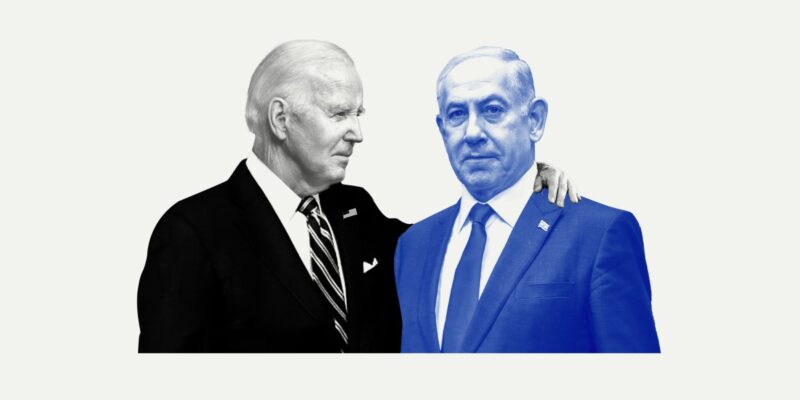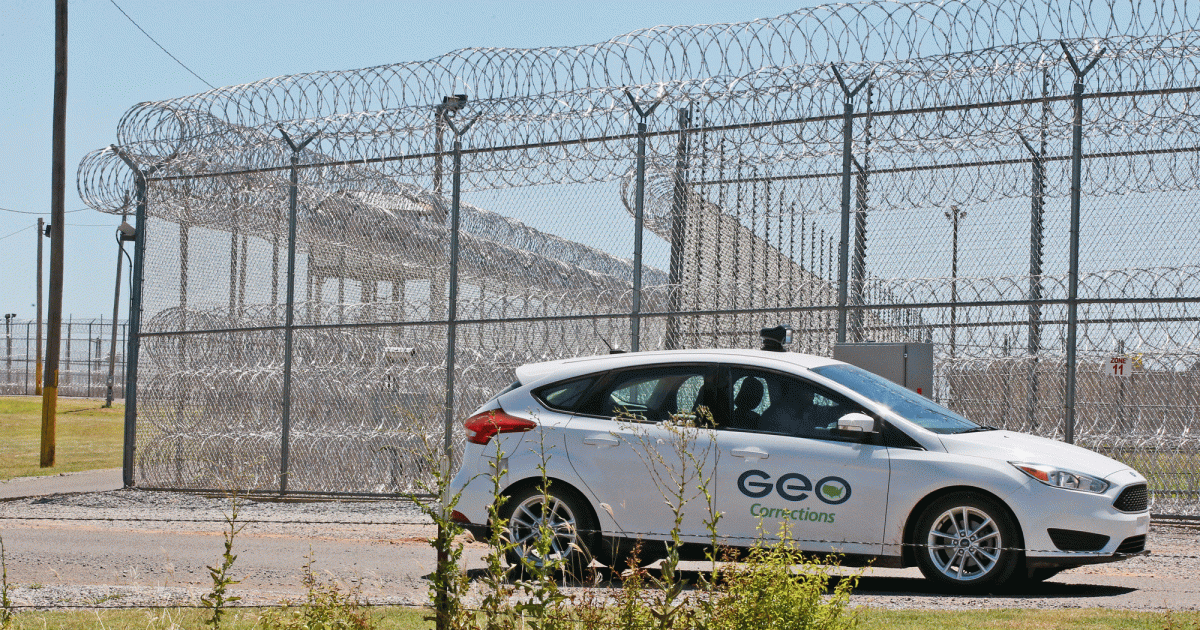
Last month, a reporter asked President Joe Biden about the chances for a ceasefire in Gaza. More than 10,000 people had already been killed there, most of them women and children. Food, water, and medical supplies were scarce. Still, the president did not hesitate in assessing the odds of a ceasefire that he had more power than almost anyone in the world to help bring about.
“None,” Biden replied. “No possibility.” Biden’s unconditional support for Israel as it waged one of the most devastating bombing campaigns in modern history was already at odds with most of the world and significant parts of his own political base. The president showed no sign of backing down.
It would take another month and nearly 8,000 more Palestinian deaths for Biden to criticize Israel in any meaningful way. At a closed-door fundraiser last week, he warned that Israel’s “indiscriminate bombing” was costing the country international support. But Biden’s own support for the government of Prime Minister Benjamin Netanyahu remained largely intact. After saying he favored the eventual creation of a Palestinian state, he reiterated his unwavering backing for the Jewish nation. “We’re not going to do a damn thing other than protect Israel,” Biden said. “Not a single thing.”
Much of Biden’s deference to Israel is deeply personal. As his supporters have put it, he identifies with the nation in his kishkes—his guts. That can be seen in the highly emotional and graphic way in which he has talked about victims of the Hamas attack being massacred, sexually assaulted, and taken hostage.
Both before and after October 7, the empathy Biden is known for has rarely extended to Palestinians. Rashid Khalidi, the Edward Said Professor of Modern Arab Studies at Columbia University, said such statements are missing “to the degree that I don’t really think he sees the Palestinians at all.” In contrast, Khalidi added, Biden sees Israelis “as they are very carefully presented by their government and their massive information apparatus.”
A former Biden administration official shared a similar perspective with me. “The President does not seem to acknowledge the humanity of all parties affected by this conflict,” this person said. “He has described Israeli suffering in great detail, while Palestinian suffering is left vague if mentioned at all.”
This article is based on conversations with former members of the Obama and Biden administrations, interviews with leading experts on Israel and Palestine, and a review of hundreds of mostly forgotten congressional hearings, speeches, and articles in which the president has explained how he sees the conflict. Together, they reveal instinctive sympathy for Israel contrasted by incuriosity about Palestinians; an increasingly outdated view of the domestic politics on the issue; and a deep commitment to a repeatedly disproven belief that peace will only come from there being “no daylight” between Israel and the United States. (The National Security Council did not make any officials available for an interview for this story.)
The result is that Biden has prioritized providing Israel largely unconditional support and the space to continue fighting in the face of intense international opposition. This approach is predictable in some respects. Israel has gotten almost whatever it wants from the United States for decades, and any American president would have supported Israel in the wake of a Hamas attack that took the lives of 1,200 people.
But Biden has long gone further than many of his fellow Democrats in defense of Israel. As a senator, he backed moving the American embassy to Jerusalem decades before Donald Trump made that a reality, boasted about attending more fundraisers for the American Israel Public Affairs Committee (AIPAC) than any other senator, and savaged an effort by George H.W. Bush to push Israel toward negotiating with Palestinians. As vice president, he undercut Barack Obama’s efforts to push Israel toward peace. As president prior to October 7, he continued policies implemented by Trump that sidelined Palestinians.
Biden administration officials are now reportedly trying to get Israel to reduce the intensity of the war in the coming weeks, but they have not said whether the US will impose consequences if it fails to do so. Nor have they been heavily critical in public. Instead, they’ve relied on the private pressure long favored by Biden, as they’ve tried—and largely failed—to restrain a far-right government that opposes Palestinian statehood and includes outright bigots in top positions.
Despite Israel ignoring many of its recommendations, the Biden administration continues to push Congress to provide $14 billion in mostly military aid with no strings attached. This comes after the United States has already supplied Israel with thousands of bombs as it has leveled much of Gaza, displaced more than 80 percent of the population, and committed the war crime of using the starvation of civilians as a weapon of war, according to a report from Human Rights Watch released on Monday.
In the early days of the war, Biden underscored the scale of the Hamas attack by saying it was equivalent to 15 9/11s for a nation of Israel’s size. The equivalent figure for Gaza, where more than 20,000 people have been killed, is now approaching 900. Just how much Biden might have been able to restrain Israel in the wake of October 7 will never be known. But a close examination of his record makes it clear why he was not prepared to try.
Biden has often traced his unyielding support for Israel to dinner-table conversations with his father about the horrors of the Holocaust and to a 1973 meeting in Israel with Prime Minister Golda Meir during his first year as a senator. Even so, it took “a long, long discussion” with Henry “Scoop” Jackson, a famously hawkish Democratic senator from Washington state, for Biden to adopt a more hardline position. As Biden explained in a 1983 eulogy of Jackson, he had not felt “nearly as strongly” about backing Israel before his senior colleague encouraged him to make multiple visits to Israel and Nazi concentration camps. As a result, Biden said, Jackson “changed a major part of my political life and my attitude about a whole segment of society that I did not understand before.”
Jackson was once seen as Israel’s strongest defender in the Senate. As a Saudi ambassador put it, he appeared “more Zionist than the Zionists,” despite being the Protestant son of Norwegian immigrants. That was reflected in extreme rhetoric that alienated some liberal American Jews and fellow Democrats. But many American Jews saw Jackson as their champion—in part because of his advocacy for Jews persecuted in the Soviet Union. (Jackson would later be called a “patron saint of neoconservatism”; his former aides Douglas Feith, Richard Perle, and Paul Wolfowitz were architects of George W. Bush’s invasion of Iraq.)
Under Jackson’s influence, Biden could similarly come across as a pro-Israel zealot. In 1982, the year Biden and Benjamin Netanyahu first met, Israel launched an invasion of Lebanon that caused massive civilian casualties. Israel’s tactics in Lebanon as it tried to destroy the Palestine Liberation Organization and empower the country’s Christian minority outraged people in the Arab world and were opposed by key American officials.

A passerby argues with protesters holdings signs that read “No to War in Lebanon” and “Stop the Bloodshed in Lebanon,” outside Begin’s residence in Jerusalem at the start of the Lebanon war.
Feinblat/AP
In the initial weeks of the war, Prime Minister Menachem Begin came to Washington to consolidate support. Begin, a right-wing leader who Hannah Arendt, Albert Einstein, and other prominent Jews once denounced for running a “Fascist” political party, arrived in Washington facing intense public criticism. Ronald Reagan’s defense secretary, Caspar Weinberger, argued publicly that Israel was employing “military force of a kind that we always have deplored.” (Two months later, Regan privately warned the Israeli prime minister that the Lebanon war threatened the “entire” US-Israeli relationship, calling it a “holocaust” whose symbol was “becoming a picture of a 7-month-old baby with its arms blown off.”)
Begin received a warmer welcome from Biden. The New York Times reported at the time that Biden told Begin that he was not critical of the Lebanon invasion. After returning to Israel, Begin provided more detail to the Israeli press by describing how a young senator had given an “impassioned speech” during a private meeting with members of the Senate Foreign Relations Committee. Begin said this senator argued that Americans “wouldn’t pay attention as to whether men, women, or children were killed” if they had to retaliate against a comparable attack from Canada. The prime minister claimed that he’d criticized the senator for devaluing civilian life. Subsequent reporting confirmed he was referring to Biden. (A National Security Council spokesperson told me he was looking into this but did not respond after that.)
During a 1992 speech to AIPAC, Biden again voiced support for Israel that made some of its strongest backers uncomfortable. Biden started out by saying that he didn’t think any senator had “ever done more fundraisers for AIPAC,” a group whose supporters were key backers of his 1988 presidential campaign. He then worked himself up to the point where he was shouting and beating his chest for emotional effect as he lambasted an unprecedented public campaign by George H.W. Bush to push Israel toward engaging with Palestinians’ demands for sovereignty and an end to the Israeli military occupation of the Gaza Strip, the West Bank, and other territory seized in the 1967 Arab-Israeli war.
Biden has long gone further than many of his fellow Democrats in defense of Israel.
As this recently unearthed 1992 video reveals, the then-senator railed against a critical effort to pressure Israel to negotiate with Palestinians and push for peace. pic.twitter.com/ifdxIixSdI
— Mother Jones (@MotherJones) December 22, 2023
At the time, Bush was demanding that Israel stop building settlements in occupied territory in violation of international law if it wanted to receive billions of dollars in loan guarantees from the United States to support the arrival of Soviet Jews. He knew that groups like AIPAC considered this to be an affront, but he believed his actions were necessary to advance peace talks. Biden was far from the only member of Congress who opposed Bush, but he did so with uncommon fervor.
Articles in the Washington Report on Middle East Affairs noted that some listeners “squirmed with embarrassment” as Biden ranted about how the issue of American aid for Israel had become “susceptible to demagoguery.” “You know, no one should take Biden seriously here. He is a cheerleader,” one attendee said. “He helps us, of course, but does opposing the peace talks or ignoring them or disparaging them really make sense? I don’t think so.”
The most revealing part of the AIPAC speech was Biden’s explanation of what remain the two pillars of his approach to Israel and Palestine. First, he told the audience that he kept his criticism of things like settlements, which he opposed, between him and Israel. Second, he made sure the two nations maintained a united front so that “the Arabs” would bend. These beliefs explained his disgust with what he considered to be a destined-to-fail effort by Bush to exert leverage over Israel and its right-wing prime minister, Yitzhak Shamir.
Shamir was not a credible partner for peace. (He had been a leader of the Stern Gang, a Jewish terrorist group that tried to form an alliance with the Nazis early in World War II to oust the British from Palestine.) His failure to secure the loan guarantees and maintain positive relations with the United States quickly became political liabilities. Two months after Biden’s speech, Israelis voted him, Netanyahu, and their Likud party out of power. They replaced them with Yitzhak Rabin and the most dovish government in the country’s history.
The results were seen as a clear sign that Bush’s efforts had succeeded in pushing the Israelis toward negotiating with Palestinians. “One cannot underestimate the role of the US government in the results,” an Israeli political scientist said after the election, echoing a widely held view. “The loan guarantee issue was critical.”
The following year, Rabin and PLO Chairman Yasser Arafat signed the historic Oslo Accord, which in spite of its flaws, is the closest the two sides have come to peace. The breakthrough was made possible in part because Bush had been willing to do what Biden said the United States should avoid at all costs: publicly pressure Israel.
A more reflective leader might have changed course, but Biden remained committed to his approach. As he explained in an interview while running for president more than a decade later, “In my 34-year career, I have never wavered from the notion that the only time progress has ever been made in the Middle East is when the Arab nations have known that there is no daylight between us and Israel.”
In doing so, Khalidi said Biden was embracing the diplomatic version of the militaristic right-wing worldview laid out a century ago by Ze’ev Jabotinsky, the founder of the Revisionist Zionism that helped shape the Likud. “In other words,” Khalidi explained, “only when the Arabs understand that they have to accept whatever it is Israel is willing to offer will there be peace.” Khalidi, one of the world’s most prominent Palestine scholars, continued, “I think that fairly represents his position to this day. I honestly don’t think this man has any sense that there’s another side to this. I don’t think he understands or is interested in the humanity, or the rights, or the very existence of the Palestinians.”
After Biden became vice president in 2009, he stuck with his “no daylight” stance. In a memoir published last year, Netanyahu wrote that Biden made his willingness to help clear during an early meeting in Washington. “You don’t have too many friends here, buddy,” Biden reportedly said. “I’m the one friend you do have. So call me when you need to.”
His commitment to insulating Israel from public pressure caused him to undermine President Barack Obama at a key moment when the administration was trying to revive peace talks. The best account of this comes from Peter Beinart, who is currently the editor-at-large at Jewish Currents. In a 2020 article based on interviews with 15 former administration officials, Beinart concluded that “during a critical period early in the Obama administration, when the White House contemplated exerting real pressure on Benjamin Netanyahu to keep the possibility of a Palestinian state alive, Biden did more than any other cabinet-level official to shield Netanyahu from that pressure.”
In 2010, Netanyahu’s government infuriated Obama and his advisers by announcing a major settlement expansion while Biden was in Israel. As Beinart reported, Biden and his team wanted to handle the dispute privately. Obama’s camp took a different route by drawing up a list of demands to be made of Netanyahu. Secretary of State Hillary Clinton then gave the prime minister 24 hours to respond, warning him, “If you will not be able to comply, it might have unprecedented consequences on the bilateral relations of the kind never seen before.”
Biden was soon in touch with a stunned Netanayhu. A former administration official who saw the transcript of their call told Beinart that “Biden completely undercut the secretary of state and gave [Netanyahu] a strong indication that whatever was being planned in Washington was hotheadedness and he could defuse it when he got back.” When Clinton saw the transcript, she “realized she’d been thrown under the bus” by Biden, the official added.
When the prime minister and his staff visited the White House soon after, one of Netanyahu’s top advisers told the New York Times Magazine that Biden reminded him, “Just remember that I am your best fucking friend here.” Thanks in part to the support from Biden, Netanyahu learned not to be concerned by Obama’s effort to push for Palestinian statehood. “He entered the lion’s den and came out in one piece,” a senior US official told Israeli journalist Ben Caspit. “He began to understand that Obama’s bark is much worse than his bite, that there is no reason to fear him.”
A former Obama administration official I spoke with could not recall any situation in which Biden was not the most sympathetic person to Israel in the room. The official added that Biden showed little curiosity about Palestine—in contrast to Obama, who was eager to meet with Palestinians and get their perspective while in the region.
For the rest of Obama’s presidency, Biden would remain the man who had assured Israeli Ambassador Michael Oren in the early days of the administration that “Israel could get into a fistfight with this country and we’d still defend you.” During Obama’s final days in office, a United Nations resolution came up that demanded a halt to Israeli settlement activity in the West Bank and other occupied territory. On a call to discuss how the United States should vote at the UN, multiple administration officials told Beinart, only Biden and then–Treasury Secretary Jack Lew supported vetoing the resolution. Unusually, Biden and Lew failed in that effort. Lew is now Biden’s ambassador to Israel.
As Lew’s return suggests, there were few surprises in how President Biden dealt with Israel prior to October 7. He stuck with Trump’s decision to move the embassy to Jerusalem, did not reverse a major announcement by Secretary of State Mike Pompeo that upended decades of US policy by saying Israeli settlements did not necessarily violate international law, and failed to reopen a separate consulate for Palestinians shuttered by Trump.
Biden did little to recalibrate after Israel elected the most right-wing parliament in its history in November 2022. Netanyahu’s National Security Minister Itamar Ben-Gvir, who has criminal convictions for inciting racism and supporting a terrorist organization, kept a picture of a Jewish fundamentalist who slaughtered 29 Palestinians at a mosque in 1994 in his living room until a few years ago. Finance Minister Bezalel Smotrich once labeled himself a proud “fascist homophobe” and was suspected of being a domestic terrorist by Israel’s equivalent of the FBI.
With the support of these cabinet ministers, Netanyahu set out to dismantle his country’s judiciary in a move that sent hundreds of thousands of Israelis into the streets in protest. The judicial coup, as critics called it, would serve to protect Netanyahu from the corruption charges he is facing, while making it easier to formalize the existing one-state reality in which Israel has control over essentially all of Israel-Palestine.
Biden did say that he hoped Netanyahu “walks away” from the judicial overhaul, but the president’s position was seen as notably weak by many of Netanyahu’s critics in Israel. Bernard Avishai explained in the New Yorker that as Israeli liberals sought “a lifeline” from the Biden administration, it became increasingly clear that the president was “loath to throw it.” Biden didn’t raise the possibility of any material consequences for Israel, much less pursue them as George H.W. Bush had. In doing so, he was sticking to the position he took on the campaign trail, when he argued that it was “absolutely outrageous” and a “gigantic mistake” for Democratic rivals like Bernie Sanders and Pete Buttigieg to suggest that there should be some conditions on aid to Israel.
The horrors of Hamas’ attack on October 7 were certain to bring forward Biden’s deep identification with Israel. In a speech three days after the attack, he spoke movingly from personal experience about the “black hole in your chest when you lose family, feeling like you’re being sucked in.” His empathy was seen by many as an appropriate response to the suffering of Israelis and Jews in mourning throughout the world.
It was also clear at the time of the speech that Israel’s response would be devastating. Israel had already cut off food, water, fuel, and electricity to Gaza. The defense minister had just announced a “complete siege” by saying that we are “fighting human animals and we are acting accordingly.” As Human Rights Watch reported in October, Israel’s decision to block food, water, and other essential material violated the laws of war, which forbid collective punishment in which civilians are held responsible for actions they did not commit.
Biden said during his October 10 speech that he’d told Netanyahu that the United States would respond with “swift, decisive, and overwhelming” force in a similar situation. He’d also cautioned Netanyahu that democracies were “stronger and more secure” when they “act according to the rule of law.” But after knowing Biden for more than four decades, there was little reason for Netanyahu to believe that Biden would apply pressure to ensure such rules were followed.
Biden’s public rhetoric became a problem for the White House. In late October, when the Gaza Health Ministry reported that more than 6,000 people had been killed, Biden said he had “no notion that the Palestinians are telling the truth” about the casualty numbers. Biden added, “I’m sure innocents have been killed, and it’s the price of waging a war.” His remarks led to immediate outrage. Reporters quickly pointed out that the health ministry’s statistics had proved accurate in past conflicts and there was little basis for Biden’s claim.
In other public remarks, which a National Security Council spokesperson highlighted for me in a detailed research memo last month, Biden called for more humanitarian aid to get to into Gaza and said that it was important to protect Palestinian civilians. In doing so, he tended to talk about Palestinians lacking food and water as if they were the victims of a natural disaster, not the victims of a deliberate effort by Israel. His comments about Palestinian civilians remained vague relative to his wrenching descriptions of how Israelis died on October 7.
Instead of pushing for a ceasefire, the Biden administration has transferred weapons. This included at least 100 2,000-pound bombs—munitions that were four times the size of what the US had typically used during its 2017 air battle against ISIS in Mosul, Iraq. US officials have confirmed that a bomb supplied by the United States with a “large payload” was used in one of the deadliest airstrikes of the war, which killed more than 100 people and destroyed an apartment block in Gaza’s Jabalia refugee camp.

The Jabalia refugee camp after an Israeli airstrike.
Fadi Wael Alwhidi/Getty
“All of our missiles, the ammunition, the precision-guided bombs, all the airplanes and bombs, it’s all from the US,” retired Israeli Major General Yitzhak Brick told a columnist with the Jewish News Syndicate last month. “The minute they turn off the tap, you can’t keep fighting. You have no capability…Everyone understands that we can’t fight this war without the United States. Period.”
The Biden administration is now asking Congress to approve the additional $14 billion of funding that will mostly go to military aid for offensive and defensive purposes. It would be the largest aid package for Israel since 1979, when the United States rewarded it and Egypt with billions of dollars in assistance for signing a peace treaty.
Late last month, Biden seemed to become slightly more open to restraining Israel by saying it was a “worthwhile thought” to consider placing some restrictions on that aid. Days later, though, administration officials said they were not pushing for any limitations. This position is now at odds with more than a dozen senators who support an amendment to ensure that weapons provided to Israel and other countries are used in accordance with the laws of war. At the fundraiser last week, Biden said that Netanyahu has told him privately, “Well, you carpet-bombed Germany. You dropped the atom bomb. A lot of civilians died.”
Biden administration officials and their supporters have argued that the administration’s “bear hug” of Netanyahu has produced results: The White House’s lobbying appears to have pushed Israel to allow in more aid than it otherwise would have. More than 100 hostages taken on October 7 have now been released from Gaza following talks in which American officials played a leading role. And so far, the administration has managed to avoid a larger regional war.
This argument must be measured against what Biden has helped enable. Since October 7, about 70 percent of the more than 20,000 people killed in Gaza have been women and children, according to the local health ministry. In the first five weeks of the conflict, children were killed at roughly 200 times the rate that they were during the Iraq War. The deaths of thousands more people trapped under the rubble are still believed to be uncounted. More than 1.8 million people, roughly 85 percent of Gaza’s population, have been displaced. Doctors have been forced to operate on patients without anesthesia. A lack of clean water, medicine, and basic sanitation is causing infectious diseases to spread through overcrowded shelters for displaced persons. University of Chicago professor Robert Pape, an internationally recognized expert on military air power, has said Gaza will go down with Dresden, Hamburg, and Cologne “as a place name denoting one of history’s heaviest conventional bombing campaigns.” This is all happening in a place that the United Nations deemed “unlivable” before the war began due to a devastating Israeli blockade.
The event earlier this month at which Biden mentioned “indiscriminate bombing” remains the closest he has come to a limited break with Israel. “I think he’s being very clear that the United States—despite its very expensive, deep support for Israel for decades—will not be capable of insulating them from a lack of support across the globe,” the former Biden administration official said. “And that I think is the most meaningful part because the president to date has taken a tack that it doesn’t matter what other countries say: This is about the US supporting Israel.”
Still, the remark about Israeli bombing, which might have been a slip on Biden’s part given that White House officials have declined to repeat it, won’t mean much if it isn’t accompanied by changes in policy. “The administration’s rhetoric is slowly shifting, but the world is seeing [America’s] actions,” the podcast host and former Obama National Security Council spokesperson Tommy Vietor said last week. “It kind of doesn’t matter what Biden says at a closed-door fundraiser.” The world sees the Biden administration vetoing a UN ceasefire resolution that only 10 out of 186 nations opposed, bypassing Congress to get tank shells to Israel more quickly, and maintaining “unshakeable” support for a nation multiple human rights groups in and outside of Israel—as well as a former head of the Mossad—have concluded forces Palestinians to live under a system of apartheid.
The political fallout of Biden’s position is now global in scale. Shibley Telhami, the Anwar Sadat Professor for Peace and Development at the University of Maryland, said Biden might now even surpass Netanyahu as the most disliked leader in the Arab world. “There’s a level of shock that I have not seen,” Telhami said, “even during the Iraq War, when it was extremely shocking.”
In the United States, polling Telhami conducted last month showed that the share of Democrats under 35 who said they were less likely to vote for Biden because of his handling of the war had jumped from 9 percent to 21 percent in just two weeks. Many other surveys show widespread opposition to Biden’s handling of the war among the young voters whose support Democrats will need to win next year. A New York Times poll published on Tuesday found that only 3 percent of voters between the ages of 18 and 29 strongly support how Biden is handling the conflict, compared with 46 percent who strongly disapprove.
Biden seems to recognize that he might not be able to insulate Israel from public opinion for much longer, and his officials are reportedly pushing Israel behind the scenes to scale back—but not end—the war in the new year. It is not the first time that Biden has found himself in this position.
In the early months of Biden’s presidency, Israel tried to evict Palestinian families in occupied East Jerusalem and injured more than 100 people during protests and an Israeli crackdown at the Al-Aqsa Mosque—Islam’s third holiest site—that ensued. Hamas responded with rocket attacks; Israel started bombing Gaza. A video of an Israeli airstrike destroying a 12-story building in Gaza that included apartments and offices for Al Jazeera and the Associated Press provided an early and enduring image of the war.
Fellow Democrats were pushing Biden to intervene and arrange for a ceasefire. In his memoir, Netanyahu writes that Biden warned him that the bombs would have to stop falling soon. In explaining why, Biden referred back to the senator who’d inspired his fervent support of Israel decades before.
“Bibi, I gotta tell you, I’m coming under a lot of pressure back here,” Biden said, according to Netanyahu. “This is not Scoop Jackson’s Democratic Party…I’m getting squeezed here to put an end to this as soon as possible.”
There was no indication that the president’s support for Israel was waning. The problem was that much of his own party was no longer with him. A lifelong politician, Biden realized what he had to do. Facing international and domestic pressure, he may soon try to halt the current war for similar reasons. His record suggests he will resist for as long as he can.















